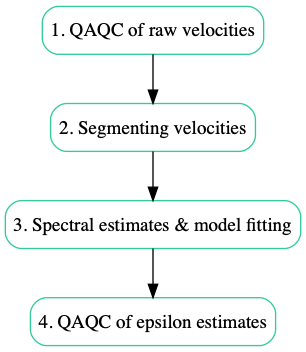Flow chart for velocity point-measurements: Difference between revisions
From Atomix
mNo edit summary |
mNo edit summary |
||
| Line 1: | Line 1: | ||
The subgroup will provide recommendations and [[benchmark datasets for velocity measurements|benchmark datasets]] that can be used to assess processing algorithm at various stages of estimating <math>\varepsilon</math>: | The subgroup will provide recommendations and [[benchmark datasets for velocity measurements|benchmark datasets]] that can be used to assess processing algorithm at various stages of estimating <math>\varepsilon</math>: | ||
[[File:Advprocessing.png|400px|thumb|Placeholder for complete flow chart for processing velocity point-measurements | [[File:Advprocessing.png|400px|thumb|Placeholder for complete flow chart for processing velocity point-measurements.]] | ||
# [[Data processing of raw measurements]] | # [[Data processing of raw measurements]] | ||
| Line 13: | Line 13: | ||
Return to [[Velocity point-measurements]] | Return to [[Velocity point-measurements]] | ||
[[Category:Velocity point-measurements]] | [[Category:Velocity point-measurements]] | ||
Revision as of 17:17, 5 March 2022
The subgroup will provide recommendations and benchmark datasets that can be used to assess processing algorithm at various stages of estimating :

- Data processing of raw measurements
- Preparing quality-controlled velocities for spectral computations
- Spectral estimates and identifying the inertial subrange
- Quality control measures of the estimated
These four processing levels coincide with the hierarchal format of the ATOMIX NetCDF velocimeters format used for archiving the benchmark datasets.
Return to Velocity point-measurements
